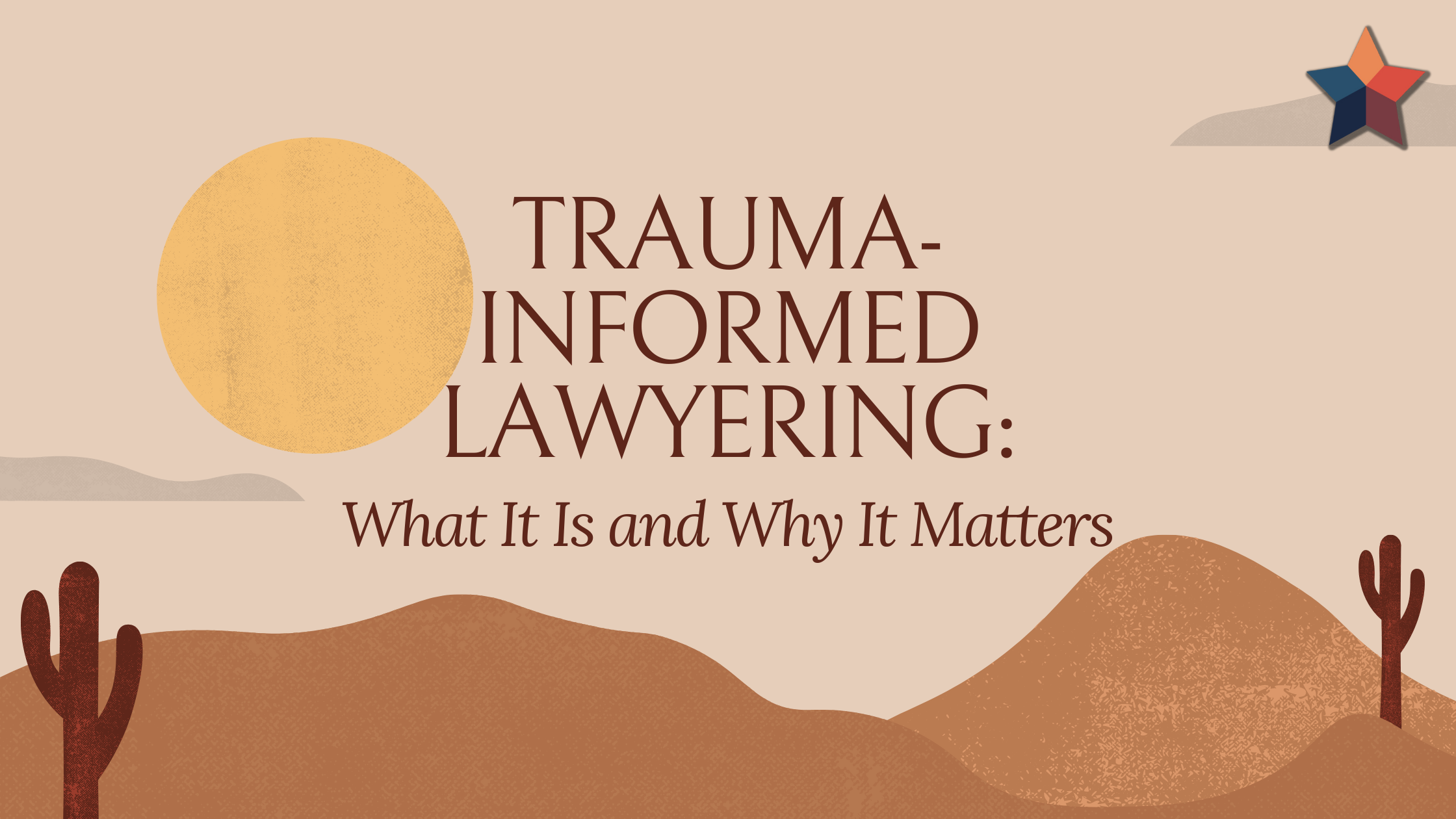Trauma-Informed Lawyering: What It Is and Why It Matters
Published on April 1, 2024 Lawyer Life

Lawyers interact with a wide range of individuals on a regular basis. There’s a good chance that their clients, colleagues, or opposing counsel have experienced some sort of trauma in their past. According to a 2022 report by the National Council for Mental Health, “70 percent of adults in the U.S. have experienced some type of traumatic event at least once in their lives.”
Trauma can manifest as a result of abuse (physical, emotional, sexual, etc.), violence, grief, or neglect, to name a few examples. While lawyers are not required to provide mental health services to their clients, there is a need to recognize the prevalence of trauma. That way, attorneys can provide their clients with the most productive and effective advocacy possible.
This is known as “trauma-informed lawyering.”
By being trauma-informed, lawyers can ease any tension or anxieties their clients may be experiencing and form a more positive attorney-client relationship. While the focus of trauma-informed lawyering is the client, practitioners can also employ these guiding principles as a form of self-care.
Let’s take a look at what it means to be trauma-informed.
A Brief Overview of Trauma-Informed Lawyering
According to “The Pedagogy of Trauma-Informed Lawyering,” a trauma-informed practice requires a lawyer to put “the realities of the clients’ trauma experiences at the forefront” and adjust their approach to be “informed by the individual client’s trauma experience.”
While trauma-informed lawyering may appear to be most applicable in cases dealing with sexual assault or child abuse, it should be a lawyer’s default mentality when providing advocacy, regardless of the practice area.
No matter the case, the client will have to relive the traumatic experiences that led to the lawsuit. As such, it’s necessary for lawyers to understand how stressful and anxiety-inducing the situation can become. Trauma-informed lawyers treat their clients with care and respect, all while working towards a favorable outcome.
Why Trauma-Informed Lawyering is Beneficial for Clients and Attorneys Alike
It’s easy to see why trauma-informed lawyering is beneficial. When clients trust their lawyers, they are more comfortable sharing information. Trauma-informed lawyering sets the groundwork by building upon a foundation of trust, so that your client is able to comfortably open up. It also establishes a foundation of respect, which leads to a successful and fruitful attorney-client relationship.
How to Become a Trauma-Informed Lawyer
Put simply, a trauma-informed lawyer will proactively trust and listen to their client, all while avoiding victim blaming. Ensuring your client understands their privacy is protected and that any discussions will be confidential is also of great importance.
In “The Pedagogy of Trauma-Informed Lawyering,” Sarah Katz and Deeya Haldar define trauma-informed lawyering by these four characteristics:
-
Identifying trauma
-
Adjusting the attorney-client relationship
-
Adapting litigation strategy
-
Preventing vicarious trauma
Similarly, in a State Bar of Texas article written by Cornelia Brandfield-Harvey titled “Trauma-Informed legal advocacy,” Brandfield-Harvey lists the ways in which a lawyer can become trauma-informed. While her article focuses on working with clients who are survivors of sexual abuse, sexual assault, and sexual harassment, the information can be applicable to any lawyer who wants to provide trauma-informed advocacy.
We’ve consolidated Brandfield-Harvey’s list and included brief descriptions below.
-
Trust: In many cases, trauma occurs as a result of a breach of trust. That’s why it’s necessary for clients to trust their attorneys. There is also a power dynamic between the client and attorney. As an attorney, you must be aware of this dynamic and ensure your client won’t feel as if you’ll take advantage of them or the situation.
-
Listen: Give your client the ability to tell their story, no matter how longwinded or inconsistent it may seem. Don’t interrupt and don’t press on for intimate details. Your client wants to be heard. The best way to establish a safe environment for them is by simply listening to what they have to say. They are opening up and being vulnerable. Your questions can wait for later.
-
Avoid victim blaming and ask the right questions: Building a trustworthy rapport with your client is crucial. When the time comes to ask questions, ensure you’re not asking anything that can be misconstrued as judgmental. Trauma can block memories so refrain from asking questions like “What happened?” Instead, ask “What do you remember about that experience?” Your client won’t be able to remember everything. Give them the opportunity to feel safe when opening up.
-
You are not the client’s therapist: This may sound harsh but it’s necessary to keep this fact at the forefront. While you can solve your client’s legal issues, you can’t solve their mental trauma. If your client mentions suicidal thoughts or other mental health concerns, connect them with a licensed mental health professional as soon as possible.
-
Treat each case individually: Clients and victims of trauma are not a monolith, so don’t treat a new client as just another number or checklist. Keep this in mind whenever you take on a new case.
Practicing Self-Care as a Trauma-Informed Lawyer
Up until this point, we’ve only spoken about working with clients who have experienced trauma. But as a trauma-informed lawyer, you are exposing yourself to trauma as well. This is known as secondary trauma or vicarious trauma. It’s necessary to know what to do to avoid experiencing detrimental effects such as burnout or compassion fatigue.
To counteract the effects of vicarious trauma, make sure to practice self-care. There are many types of self-care, including physical, intellectual, professional, spiritual, and social self-care. If you’re unsure about what exactly counts as self-care, then read our articles about achieving a healthy work-life balance and healthy habits for lawyers to boost their mental and physical well-being.
Remember, your mental health is also in the balance. Lawyer mental health is pivotal. Just because you’re taking care of your client doesn’t mean you should stop taking care of yourself.
Take the First Step Towards Becoming a Trauma-Informed Lawyer
Trauma-informed advocacy is built on mindfulness, compassion, and empathy. Being aware of trauma and how it affects those around us is paramount when it comes to providing effective legal advocacy. Not only that, but being trauma-informed can help us become more compassionate, caring people.
For further insight into trauma-informed advocacy, take a look at the resources we’ve compiled below.
Resources and Further Reading
- An introduction to trauma-informed lawyering — State Bar of Michigan
- Wellness Resources: Trauma-Informed Lawyering — Villanova University, Charles Widger School of Law
- Establishing a Trauma-Informed Lawyer-Client Relationship — American Bar Association
- The Legal Burnout Solution: Strategies for a Trauma-Informed Law Practice — American Bar Association
- The Pedagogy of Trauma-Informed Lawyering — NYU School of Law
- Trauma-Informed Legal Advocacy (TILA) Project — National Center on Domestic Violence, Trauma, and Mental Health
- Trauma-Informed legal advocacy — Texas Bar Blog
- What Every Lawyer Should Know About Sexual Violence — Texas Bar Blog
- Vicarious Trauma — TexasBarCLE
- Trauma Informed Representation In Asylum Cases — TexasBarCLE

Otto Nicli
Otto Nicli is part of the State Bar's Web team and serves as the blog writer for the Texas Bar Practice website. He also plays a part in marketing and video production. In his free time, he enjoys watching Top Chef with his wife, collecting records, reading, and going to shows.